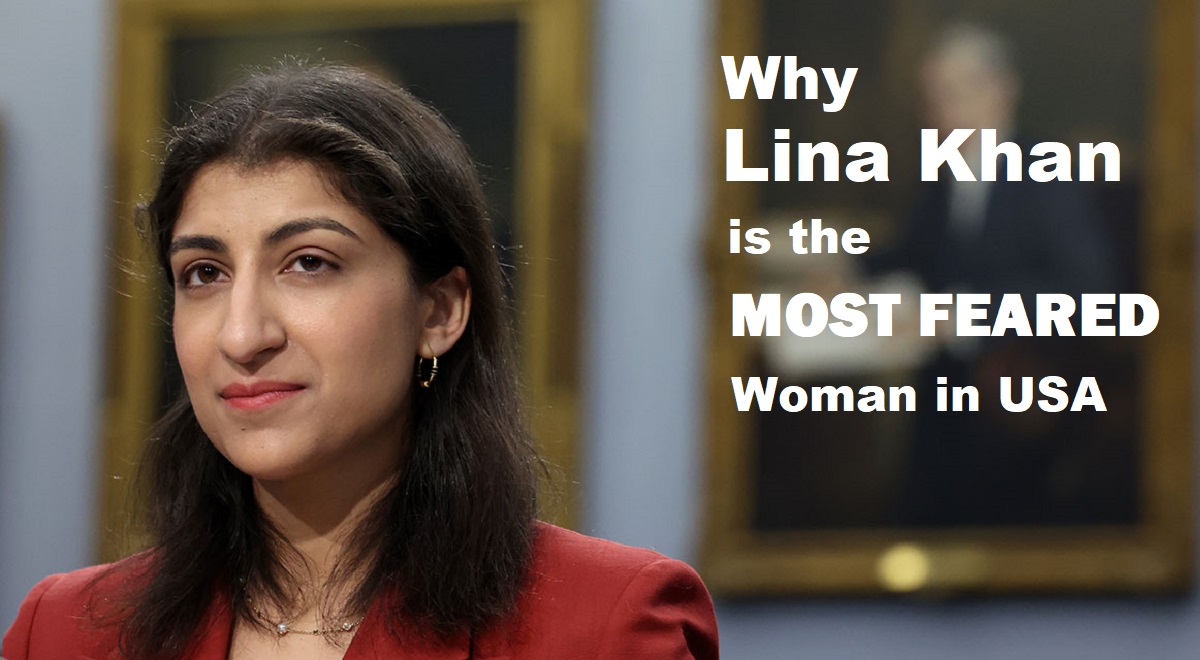The tech titans of Silicon Valley are shaking in their boots, and it’s all because of one name: Lina Khan. At just 34, Khan is wielding a level of power that could bring even the mightiest digital empires – companies like Amazon, Google, and Facebook to their knees.
Lina Khan is a prominent figure in the realm of antitrust law and regulation, particularly known for her work in rethinking and challenging the traditional approaches to competition in the digital age. As the Chair of the Federal Trade Commission (FTC), she has become a key player in shaping policies aimed at curbing the power of large tech companies.
Khan gained widespread attention with her 2017 Yale Law Journal article, “Amazon’s Antitrust Paradox,” where she argued that current antitrust frameworks were inadequate for addressing the dominance of modern tech giants. Her work advocates for a more comprehensive approach to regulating monopolistic behavior, focusing not just on consumer prices but also on market structure and the potential for long-term harm to competition.
Khan’s leadership at the FTC marks a significant shift towards more aggressive antitrust enforcement, making her a central figure in the ongoing debate about the role of government in overseeing the digital economy.
Amazon’s Antitrust Paradox
Lina Khan’s 2017 article “Amazon’s Antitrust Paradox,” published in the Yale Law Journal, sent shock-waves through corporate America, particularly within the tech industry and among large corporations.
Challenging the Consumer Welfare Standard
Khan critiqued the prevailing “consumer welfare” standard in antitrust law, which primarily focuses on consumer prices and efficiency. This standard, dominant since the late 20th century, tends to favor large corporations as long as they can argue that their practices lead to lower prices for consumers. Khan argued that this narrow focus overlooks the broader harms that monopolistic power can inflict on competition, innovation, and market structure.
Reinterpreting Antitrust in the Digital Age
Khan highlighted that tech giants like Amazon could wield immense power without necessarily raising prices. Instead, their dominance comes from controlling key market platforms, engaging in predatory pricing to eliminate competitors, and using data to create barriers to entry. She suggested that antitrust enforcement should consider these factors, which could lead to more aggressive scrutiny of business practices that had previously been deemed acceptable.
Proposing a Structural Approach
Khan advocated for a shift towards a “structural” approach to antitrust enforcement, where regulators focus on maintaining market structure and competition, rather than just consumer prices. This would involve breaking up or restricting the power of dominant firms, even if they haven’t directly harmed consumers through price hikes.
Implications for Big Tech
By using Amazon as a case study, Khan’s article implied that many of the practices employed by major tech companies could be grounds for antitrust action. This challenged the business models of not just Amazon, but also other tech giants like Google, Facebook, and Apple, which rely on similar strategies to maintain and expand their dominance.
Khan’s article threatened the legal and economic frameworks that had allowed large corporations, especially in tech, to grow with minimal regulatory interference. If her ideas gained traction, it could lead to more stringent regulations, increased litigation, and potentially the breakup of some of the world’s most powerful companies.
Who is Lina Khan
Lina Khan, born on March 3, 1989, in London, England, is of Pakistani descent. Her parents immigrated from Pakistan to the United Kingdom before moving to the United States when she was 11 years old. Khan grew up in the U.S., where her interest in law and economics eventually led her to pursue a career in these fields.
Lina attended Williams College, a prestigious liberal arts college in Massachusetts. She graduated with a Bachelor of Arts degree in Political Science in 2010. During her time at Williams, she developed a keen interest in the intersection of law, policy, and economics, which would later shape her career.
Khan earned her Juris Doctor (J.D.) degree from Yale Law School, one of the top law schools in the United States. It was during her time at Yale that she wrote the influential article “Amazon’s Antitrust Paradox,” which brought her significant attention in the legal and academic communities.
After law school, Khan worked at various institutions focused on competition law and policy. She served as a legal advisor to the Open Markets Institute, an advocacy group that focuses on issues of monopoly power. She also worked as a law clerk for Judge Robert Katzmann of the U.S. Court of Appeals for the Second Circuit.
Khan’s work has been widely published in law reviews and journals, with a focus on antitrust law, competition policy, and the power of large corporations, especially in the tech sector. Her scholarship has been influential in reshaping the debate on antitrust enforcement in the digital age.
In 2021, President Joe Biden appointed Lina Khan as the Chair of the Federal Trade Commission, making her one of the youngest individuals ever to hold this position. Her appointment signaled a shift towards more aggressive antitrust enforcement, particularly aimed at curbing the power of big tech companies.

